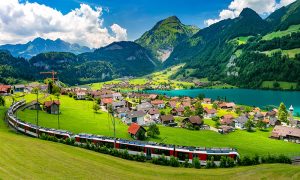In recent years, Iceland, a small Nordic country, has become a new living destination for many people due to its ultra-high happiness index, pure natural environment and perfect social welfare. Especially inIceland's labor shortage continues to grow in 2025Against the background of the government is gradually relaxing the threshold for work visa applications for blue-collar jobs, opening up a whole new channel for unqualified, skilled talent. Then.No qualifications really canImmigration to IcelandDo you want to apply for a job? What jobs are available to apply for? What are the wages and benefits? This article answers all your questions.
i. why "blue collarimmigrantsIs it becoming a trend"?
With a population of only about 370,000, Iceland relies heavily on foreigners for its labor force. Especially after the epidemic, a large number of jobs in the service and basic industries have been left vacant.The government has had to step up its efforts to bring in blue-collar workers. According to data released by the Icelandic Labor Agency in early 2025, there is an extreme shortage of manpower in the following areas:
-
building industry
-
Fisheries and seafood processing
-
Catering Services
-
Elderly care
-
Cleaning and sanitation
-
Seasonal farm workers
These positionsNo university degree requiredAs long as you are physically fit, have some work experience or are willing to work hard, it is possible to be sponsored by an employer to get a legal work visa or even apply for permanent residence in the future.
Second, no academic qualifications can apply for blue-collar popular jobs recommended
Here are the currentIcelandic immigrantsTypes of blue-collar jobs for which the Bureau has a high demand for real hiring in the labor market::
1. 🛠 Construction workers / carpenters / electricians
-
Salary range: approx. 3,000-4,500 euros/month
-
Requirements: Physical fitness, site experience preferred
-
Strengths: Stable workload and high demand year-round
2. 🍳 Food Service Worker / Kitchen Helper
-
Salary range: approx. 2200-3500 EUR/month (including tips)
-
Requirements: Basic English, hardworking and willing to learn
-
Advantage: low language requirement, suitable for first-timers
3. 🧼 Cleaner / Hotel Housekeeper
-
Salary range: approx. 2200-2800 EUR/month
-
Requirements: careful, responsible and simple work
-
Advantage: mostly shift work, suitable for female applicants
4. 🐟 Seafood processing plant workers
-
Salary range: approx. 3,000-4,000 euros/month (including overtime)
-
Requirements: ability to adapt to cold environments, repetitive operations
-
Advantage: food and accommodation included, stable income
5. 🧓 Elderly caregivers / community assistants
-
Salary range: approx. 2500-3500 EUR/month
-
Requirements: patience and basic nursing experience preferred
-
Advantage: job security and respect for the profession
Icelandic employer-sponsored immigration process
No matter how educated you are and want to travel legally to Iceland through a blue-collar position.The core is to find employers who are willing to sponsor. The process is as follows:
-
Searching for Icelandic employer job offers online or through intermediary platforms
We recommend looking at job boards such as EURES, the official website of the Icelandic Job Agency, LinkedIn, Indeed, etc. -
Submit your CV and motivation letter in English for a video interview
Communicate intentions and willingness to work in basic English, showing your sincerity and ability. -
Obtaining a job contract Offer Letter
Once you are hired by an employer, the employer will cooperate with you in applying for a residence permit. -
Submission of Work and Residence Permit applications (Work and Residence Permit)
It is generally initiated by the employer andIcelandic immigrantsBureau (UDI) official website to submit materials. -
Obtaining a visa to work in Iceland
Initially, you can obtain a temporary residence permit for 1 or 2 years, which can be renewed and made permanent after good performance.
IV. Reference to the true cost of living for blue-collar immigrants
While Iceland's wages are high, the cost of living is not. Take Reykjavik, the capital, for example:

| sports event | Average monthly expenses (single person) |
|---|---|
| Rent (single sharing) | €800-1200 |
| Food & Beverage | €400-600 |
| transportation | €100-150 |
| Other miscellaneous living expenses | €200-300 |
| add up the total | Approx. €1600-2300 |
If the job includes accommodation and meals, you can save almost half of your expenses and have more room for savings.

V. Advantages and challenges of blue-collar migration
✅ Advantage:
-
No academic threshold, low language requirement
-
Higher salary than similar positions in many Asian countries
-
Stable job, can bring spouse/children to settle
-
Clear immigration path, hopefully applying for long-term residency
⚠️ Challenge:
-
Cold climate and long acclimatization period
-
High daily consumption, need to reserve a certain amount of money in advance
-
Basic English or Icelandic for better integration
-
Employer resources are scarce and need to be proactive in seeking opportunities
✍️ Summary:Blue-collar immigrants in IcelandIs it for you?
If you are not willing to domestic low-paid labor, eager to jump out of the comfort zone to find a new direction of high-income, stable life, then Icelandic blue-collarWork migrationA cost-effective option indeed.It is especially suitable for young people or couples who are willing to work hard, have some hands-on skills, and plan to go abroad to change their destiny.
📢 Immigration is no longer exclusive to the elite, and there is a way out without a degree!
If you are willing to work hard, you can reap a decent income and a whole new life in Iceland.






